Brown School honors Clancy with 2023 Distinguished Alumni Award

Passion and patience. Margaret Clancy has devoted a generous dose of each during her 24-year career with the Center for Social Development (CSD) in the Brown School at Washington University in St. Louis. They have paid off not only for her career, but for millions of children and families across the United States and around the world.
Over the past two decades, Clancy’s work as Policy Director and College Savings Initiative Director at CSD has helped more than 15 million children build assets in Child Development Accounts (CDAs) – government-provided investment accounts earmarked for education or other developmental goals. She has designed and led large-scale policy demonstrations, including SEED for Oklahoma Kids (SEED OK), a rigorous test of CDAs and what may be the longest-running social experiment in the country.
On April 13, 2023, the Brown School recognized Clancy for her leadership with a Distinguished Alumni Award. Presenting the award, Interim Co-dean Tonya Edmond said, “As a result of Clancy’s vision and commitment to expanding access to Child Development Accounts, asset-building research and policy in the United States has undergone a significant transformation and created a more promising future for families and children.”
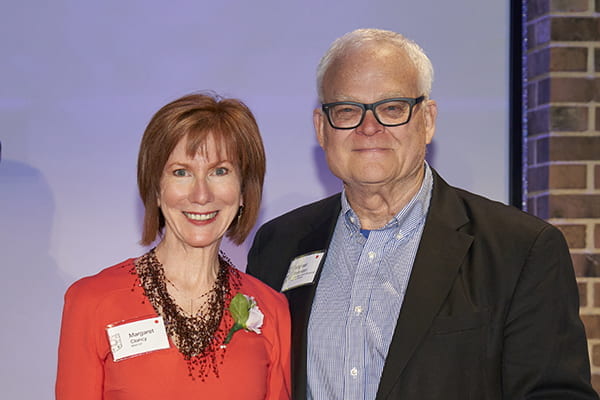
Blending expertise in finance and social work
Clancy earned a bachelor’s degree in business administration from Southern Illinois University Edwardsville and went on to a career in the business and finance world, administering corporate 401(k) and defined-contribution pension plans as the vice president of a large trust company. One of her clients, in fact, was Washington University. After almost two decades in finance, she found herself at a crossroads.
“I had an interest in social justice issues, and mergers and changes happening in the financial services industry made me consider a new career path.”
That led to her enrolling in the Brown School for her master’s in social work. She retained her demanding day job at Boatmen’s Trust Company, fulfilling her social work curriculum at night. She initially thought she might pursue a concentration in mental health, but then a policy-related course with Michael Sherraden, George Warren Brown Distinguished University Professor and Founding Director of CSD, opened a fortuitous door.
“Michael had published his book, “Assets and the Poor,” and was proposing these life-long savings accounts for all children, which piqued my interest,” Clancy recalled. “I remember I asked him a question about how they would be administered, and he simply said to me: ‘You’ll figure that out.’ That’s when I realized I could make a difference if I merged these two careers, finance and social work.”
“Margaret cares deeply about contributing her financial expertise to the fundamental social-work goal of improving household well-being,” said Lissa Johnson, Associate Director of Administration and Research, and Clancy’s colleague for 25 years.
“Her time and energy on the SEED OK policy experiment have shown that strong, positive working relationships across for-profit, nonprofit, and government sectors can indeed be a workable strategy for implementing financially inclusive social policy—in this case, expanding financial access and assets for kids, beginning at birth,” Johnson said.
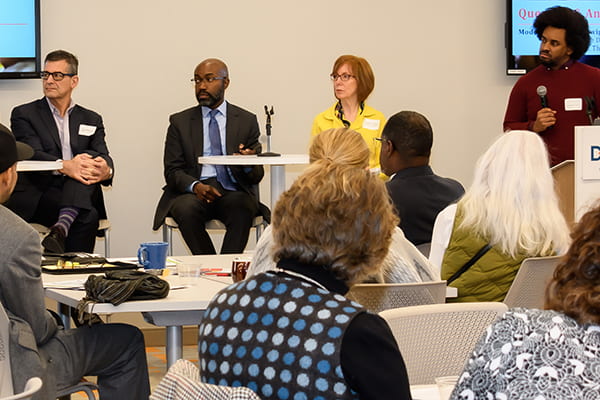
Shaping and testing policy
After graduating with her MSW in 1997, Clancy soon found her place at CSD, working for Sherraden. She began researching 529 college savings plans as a model for developing asset policy by adapting a state’s existing account infrastructure and investments.
After a competitive RFP process, in 2005, Clancy, Sherraden and CSD researchers entered into an agreement with the Oklahoma Treasurer’s Office, and partnered with the Oklahoma State Department of Health, Oklahoma Department of Human Services, TIAA, and others, to begin SEED OK, an experimental test of a CDA policy. A random selection of 1,360 Oklahoma newborns received state-owned OK 529 College Savings Plan accounts of $1,000; parents were also offered incentives to open their own 529 accounts for their children. An additional 1,350 children randomly selected for the control group received no special accounts but were not restricted from saving and building assets.
The research has shown meaningful increases in the share of children with assets set aside for higher education. Children with CDAs also have better social-emotional development. Their mothers have fewer depressive symptoms and higher expectations for the child’s education. They engage in more positive parenting.
“Our findings indicate that having dedicated savings seems to influence the children and their mothers,” Clancy said. “Some of these positive effects are greater for disadvantaged families and families of color.”
The youth who received the CDA through SEED OK are turning 16 this year, and evidence from the ongoing experiment continues to shape CDA initiatives around the world. Seven U.S. states have adopted statewide policy as a result of the research, including Pennsylvania, California, Illinois, Nebraska, Nevada, Rhode Island and Maine. Other countries, including Singapore, the United Kingdom, Korea and Israel, have also enacted CDAs. All of these initiatives were developed in consultation with Clancy and CSD’s team of experts.
Clancy also estimates she has shared research and testimony to state policymakers and nonprofit organizations in more than 25 states that have shown interest in CDAs.
Pennsylvania’s Keystone Scholars is one of the policies developed through Clancy’s consultations.
“At countless points along the way from proposal to legislation and from law to policy, Margaret Clancy shaped Keystone Scholars by sharing rigorous evidence and a vision for policy that gives every child a head start on what they need to succeed.”
Julie Peachey, Pennsylvania’s Deputy State Treasurer for Consumer Programs
“Over 500,000 Pennsylvania children have assets for higher education in a Keystone Scholars account, and Margaret played an important role in making that happen.”
Keystone Scholars has provided an automatic deposit into a Child Development Account for every child born or adopted in the state since January 1, 2019. The deposits are funded by surplus earnings from the Pennsylvania 529 College and Career Savings Program (PA 529) Guaranteed Savings Plan, and the Pennsylvania Treasury Department administers the accounts. The state is also testing ways to target supplemental deposits into the accounts of disadvantaged children.
“At countless points along the way from proposal to legislation and from law to policy, Margaret Clancy shaped Keystone Scholars by sharing rigorous evidence and a vision for policy that gives every child a head start on what they need to succeed,” said Julie Peachey, Pennsylvania’s Deputy State Treasurer for Consumer Programs.
“Over 500,000 Pennsylvania children have assets for higher education in a Keystone Scholars account,” Peachey added, “and Margaret played an important role in making that happen. She has been a tremendous sounding board for our team and truly cares about the details of our program implementation.”
In policy work, patience is key, Clancy explained. Legislation often takes years to enact.
Clancy is particularly proud that the policy has found footholds in red, blue and purple states. “It’s rare to find bipartisan support, but Child Development Accounts have been able to do so.”
“Margaret’s skills in research and policy, and unwavering dedication, have been instrumental to pioneering this work,” Sherraden said. “We have been so fortunate to have her financial acumen and commitment to social and economic equity. She has helped to change the lives of millions of children and their families.”
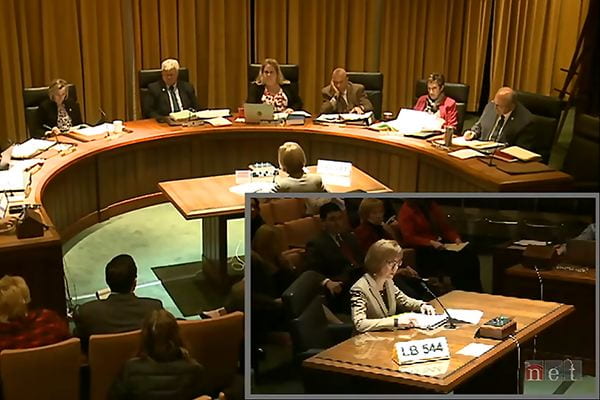
Forging new connections
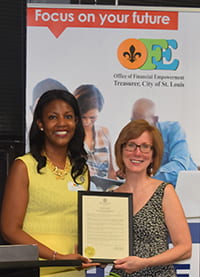
A positive byproduct of establishing these accounts is that diverse state departments and programs must work together in new ways, said Clancy. Treasury departments, education departments, health and human services: each has a part to play in providing data and resources. In addition, there are countless ways for nonprofits and philanthropic organizations to partner or make monetary contributions.
“There is never going to be a single thing that will end poverty or solve educational access, but when we have these diverse groups working together for the greater good, we can get closer and closer to that goal.”
CSD’s vision for Child Development Accounts also couples with its commitment to financial inclusion and capability within social work resources and programs. “You have to have the education element in tandem with the asset development work,” Clancy explained. For example, the Maine Department of Education works closely with that state’s CDA team to shape educational resources offered to participating families.
Focusing on the ultimate goal
Clancy can’t point to one moment or event that has defined her more than two-decade career in asset development, but perhaps the most exciting element is the steady movement toward an ultimate national goal.
“For this policy to have the breadth that Michael envisioned – to make larger deposits for all kids and greater resources for disadvantaged children – it is going to take federal resources,” Clancy said. “That is the next big goal. Lawmakers want to see how things operate on the state level before they jump. But conversations are underway; there is federal legislation being drafted right now – and that’s the first step.”
Clancy is humble and quick to make clear that just as CDA policies and interest have expanded, so have the advocates and scholars who support the vision, including Sondra Beverly, CSD Senior Scholar; Mark Schreiner, CSD Senior Scholar; and Jin Huang, Research Professor in the Brown School and CSD Faculty Director.
“In children’s account research and in policy circles, Margaret is a pivotal figure,” said Huang, who is also Professor in the Saint Louis University School of Social Work. “Many of the advances of the last decade came about through her work. She not only participated in the design and implementation of the blueprint for SEED OK, but she has also led the process of disseminating findings and developing policy informed by the evidence.”
“Her clear thinking, rigorous work ethic, detail-oriented style and insistence on high-quality work have deeply reshaped my perspective on what it means to be a good policy researcher,” Huang added.
Clancy, Sherraden and the CSD team have also trained doctoral students who are now in prominent faculty positions across the United States.
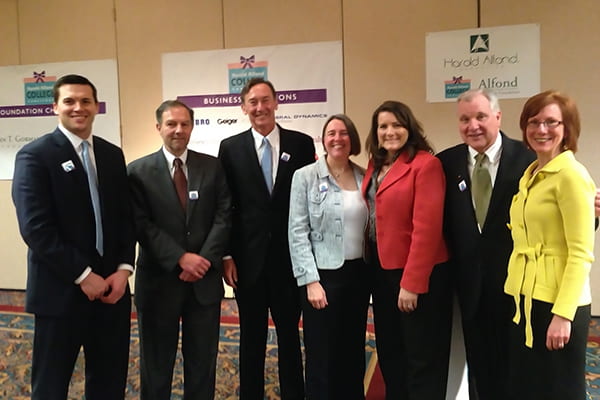
Fueling her passion
During Clancy’s childhood, her family faced their own financial hardships. Both parents had to drop out of high school after the Great Depression hit, and her father became physically disabled when she and her sisters were children. Her mother received undergraduate and graduate degrees, often attending evening classes, to become an elementary teacher and support the family.
“Even though our resources were limited, my parents instilled in us that we should consider others who were less fortunate. It was always important to me to support children and underscore the power of education.”
Her work now allows her to do both. Clancy reviews quantitative and qualitative data from research subjects, but per research regulations, she does not have direct contact with the parents and children enrolled in the SEED OK study. She fondly recalls one day, however, when the phone rang at her desk. As she picked up, a woman on the other end began talking excitedly.
“She was effusive about how much her son’s SEED OK account changed her outlook. She said it made her son excited for school, and he took his schoolwork more seriously,” Clancy remembered. “I’ve been doing policy work for a long time, and I often sit behind a screen all day looking at data or writing papers. When I feel tired or discouraged, I think of that call. I deeply hope that that woman’s experience is reflective of millions of others.”
You may also like
In this video from the Brown School, Margaret Clancy discusses her contributions to children’s account policy and the experiences that have shaped her work.
